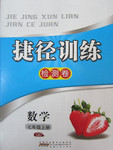题目内容
When he asked me ____ I needed, I said I wanted red.
- A.what a colour
- B.what the colour
- C.what colours
- D.what the colours
what colour /coloers

 捷径训练检测卷系列答案
捷径训练检测卷系列答案 小夫子全能检测系列答案
小夫子全能检测系列答案阅读下面短文,掌握其大意,然后从21—40各题所给的四个选项(A、B、C和D)中,选出最佳选项,并在答题卡上涂黑。
My husband had just bought a new washing machine for me. I decided to use it the 21 day, and I washed a lot of things. Everything worked 22 , but I couldn't find 23 of my husband's socks though I had looked 24 for it.
The next morning, I got ready for 25 as usual. When the bell rang, the students came in. I greeted them and told them 26 we were going to do 27 .
When I turned 28 to write on the blackboard, the class burst out 29 . They l aughed and laughed. They laughed so much, in fact, that I was 30 the headmaster would be in to see all this.
aughed and laughed. They laughed so much, in fact, that I was 30 the headmaster would be in to see all this.
I asked the class to 31 , but the 32 I talked, the more they laughed. So I thought I had better pay 33 attention to them and continue to write on  the blackboard. When I did this, they laughed even more.
the blackboard. When I did this, they laughed even more.
Before long, the teacher who had the room next to 34 came to see 35 all the laughter was about. When he came in, he started 36 , too.
"Good Heavens ! "I said. "Will 37 please tell me what is so 38 ?"
"Oh, God," said the teacher, " you have a  brown 39 stuck to the back of your shirt. "
brown 39 stuck to the back of your shirt. "
So that's 40 I found my husband's missing sock.
"Oh, well," I said to the class, "let's just say you have had an unforgettable lesson on static electricity(静电)."
| 【小题1】 |
|
| 【小题2】 |
|
| 【小题3】 |
|
| 【小题4】 |
|
| 【小题5】 |
|
| 【小题6】 |
|
| 【小题7】 |
|
| 【小题8】 |
|
| 【小题9】 |
|
| 【小题10】 |
|
| 【小题11】 |
|
| 【小题12】 |
|
| 【小题13】 |
|
| 【小题14】 |
|
| 【小题15】 |
|
| 【小题16】 |
|
| 【小题17】 |
|
| 【小题18】 |
|
| 【小题19】 |
|
| 【小题20】 |
|
One day a teacher asked her students to list the names of 44 students in the classroom on two sheets of paper, leaving a space between each name. Then she told them to think of the 45 thing they could say about each of their classmates and write it down.
It 46 the class some time to finish their assignment, and as the students left the room, each one 47 the papers. That Saturday, the teacher wrote down the 48 of each student on a separate sheet of paper and 49 what everyone else had said about that individual.
On Monday she gave each student his or her list. Before long, the whole class was 50 . “Really?” she heard whispered. “I never knew that I 51 anything to anyone!” and, “I didn’t know others liked me so much” were most of the comments. No one ever 52 those papers in class again. She never knew if they discussed them after class or with their parents, but it didn’t 53 . The exercise had completed its 54 . The students were 55 with themselves and one another.
That group of students moved on. Several years later, one of the students was 56 in Vietnam War and his teacher 57 the funeral of that special student. After the funeral, most of Mark’s former classmates left. Mark’s mother and father were there, obviously waiting to speak to his teacher.
“We want to 58 you something,” his father said, taking a 59 out of his pocket.
“They found this on Mark when he was killed. We thought you might 60 it.”
Opening the wallet, he 61 removed two worn pieces of notebook paper that had obviously been taped, folded, and refolded many times. The teacher knew without 62 that the papers were the ones on which she had listed all the good things each of Mark’s classmates had said about him.
“Thank you so much for doing that,” Mark’s mother said. “As you can see, Mark 63 it.”
| 【小题1】 |
|
| 【小题2】 |
|
| 【小题3】 |
|
| 【小题4】 |
|
| 【小题5】 |
|
| 【小题6】 |
|
| 【小题7】 |
|
| 【小题8】 |
|
| 【小题9】 |
|
| 【小题10】 |
|
| 【小题11】 |
|
| 【小题12】 |
|
| 【小题13】 |
|
| 【小题14】 |
|
| 【小题15】 |
|
| 【小题16】 |
|
| 【小题17】 |
|
| 【小题18】 |
|
| 【小题19】 |
|
| 【小题20】 |
|
 y
y less
less 2 like th
2 like th is has ever happened to us before. We’ve never 53 anything or been given anything. Things 54 this just don’t happen to us .” But it did happen. Now every time I think of the 55 at the restaurant a smile spreads across my mouth, as I remember how once, I felt a strong desire to give freely to another.
is has ever happened to us before. We’ve never 53 anything or been given anything. Things 54 this just don’t happen to us .” But it did happen. Now every time I think of the 55 at the restaurant a smile spreads across my mouth, as I remember how once, I felt a strong desire to give freely to another. prepared C. paid D. finished
prepared C. paid D. finished